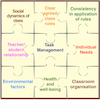Helping all children become happy learners
Health and Well-Being
Introduction
All students (and their teachers) will at some time have health issues ranging from minor colds and coughs to life-threatening conditions. Each will affect their capacity to learn and influence their social behaviour. Apart from dealing with the actual symptoms of the illness, being unwell affects our attention, memory and motivation, attributes necessary for learning. Even before we are aware of our symptoms there are subtle changes in our behaviour as our primitive reptilian brain starts to respond to the threat. We tend to seek being at home and can be more argumentative, particularly with close family members.
Clearly when students are very unwell they are usually absent and any impaired ability to learn is not relevant. However, there are always students coping with the usual seasonal viruses, sniffing and coughing in the classroom. Less commonly, there will be students who are managing chronic conditions such as cancer, diabetes etc. As a teacher it is important to be understanding of this and though often there is little in practical terms that can be done, awareness helps us to respond more appropriately to the needs of these students. There are, however, some contexts when more than empathy is required:
Infant and pre-school children
Until about the age of 7 or 8 children are prone to glue ear and during seasonal coughs and sniffles many will be struggling to hear correctly. This can affect certain frequencies more than others and can significantly interfere with auditory processing. Even in classrooms fitted with soundfield systems, teachers of this age group may need to respond to the sniffles and coughs by slowing down and simplifying language. This will improve student understanding of explanations and instructions, which in turn, reduces off-task behaviour.
Students with diabetes
Aside from the medical needs of these students diabetes can impact on learning and behaviour. This is explored more fully in the article on diabetes. However, briefly here, differentiation of support is required to ensure that their condition does not impact on their learning. Diabetics frequently need to leave the classroom during lessons. This can be for testing, feeling 'low' (hypoglycemia) or needing the toilet more than peers. Careful handling of this is required to minimise any attention drawn to these absences. Use of task boards can help the student return quickly to a class task without the need for distracting teacher student interactions. Maintaining and building self-esteem is crucial in keeping diabetic students positive and motivated about learning. Monitoring of diabetic students relationships with peers is also important to ensure that their condition does not interfere with their socialising and friend-making opportunities.
Students with chronic conditions
Managing these students will depend on the exact nature of their needs and degree to which it interferes with their schooling and interaction with peers. Providing packs of curriculum work to cover periods of absence helps to ensure that these students do not miss out on areas of learning. In children with long term conditions they may already have accumulated many gaps in the learning. They are therefore unlikely to be achieving their true learning potential and this may adversely affect their self-esteem. Providing pre-learning support may be necessary to ensure they revisit pre-requisite skills and knowledge. Enlisting parental support with this is essential. Peer group support may also be helpful when students return to school after long absences or where absence is regularly happening. Interventions such as Circle of Friends can be useful. Some students with chronic illness can also present with behaviours that cause concern. Attention seeking behaviours directed at peers may be present in those who absences and illness have disrupted friendship forming within the class. A few students may try to use their illness as a way of avoiding difficult subjects and topics. This may be a defense against exposing their knowledge gaps in front of peers.

Advertisement



